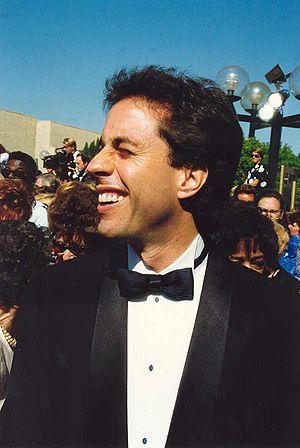“We’re craving the nondigital even more these days, the authentically human interaction,” says Jerry Seinfeld, explaining (I would argue) not just live standup comedy’s appeal but the appeal of almost any great customer experience. “We need to see some schmuck sweat.”
Authentic human interactions make the cash register ring
Although Seinfeld’s fee is notably higher up the keynote speaker’s pay scale than mine, like Jerry, I consult and speak about the customer experience and customer service. And to my way of thinking, the Seinfeld Customer Experience Theorem is directly applicable to almost any business.
For example, hospitality. As quantified in JD Power’s recent review of hotel guest satisfaction, the higher the number of “authentically human interactions” (Seinfeld’s phrase), the higher the guest satisfaction. “Overall satisfaction is highest among guests who interact with four or more staff types” after check-in, and satisfaction drops dramatically below the industry average when guests have no interactions with employees beyond check-in.
Offload the transactional: Getting out of your customers’ way
The flipside of the Seinfeld Customer Experience Theorem is this: A business needs to be careful where and how it inserts these authentic human experiences. Which of the human interactions your employees offer add to the customer experience, and which just get in the way? Customers in almost every arena of business prefer to make use of the systems available these days that offload the transactional: systems that either automate transactional minutiae or turn them over to the customer.
I would argue that (to continue, literally, the Seinfeld example), standup comedy customers aren’t interested in any sweat being spilled over the minutiae that comes before and after the buying experience. With the systems available today for ticketing a live event, customers love being able to order online, pick their exact section and seat, get a virtual-reality prediction of what the stage will look like from their prospective seat, and print their own tickets before leaving home. They don’t want to have to call Seinfeld’s booking agency for a touring schedule. They don’t want to wait on permahold for the chance to buy tickets over the phone, or in a line around the block to buy them in person. They don’t want to fumble for cash to pay for parking in a venue where credit card readers haven’t yet been installed.
Investing the transactional surplus: Building something special for your customers
“Offload the transactional” is an important principle when working with digitally informed customers. But at some point, a business needs to step back from its automated efficiency mania and invoke the human-centered Seinfeld Theorem. Take the surplus you gain from automating transactional details, and invest it in the live-performance aspect of your business. Patrick O’Connell’s phenomenally high-touch restaurant, The Inn At Little Washington, does, for simplicity’s sake, make use of an online reservation system. But Chef O’Connell also employs enough waiters to fill all the water glasses at a table simultaneously. You heard that right: simultaneously. As in: in unison. It’s extraordinary. It’s theater. And it’s business. That’s the Inn At Little Washington’s cash register you hear ringing.
Hotels and other traditionally high-touch businesses aren’t likely to follow O’Connell’s reinvestment lead after they offload the transactional details to computers or to their customers. Instead, like the airlines, they’ll leave it at that, pass the savings along to their shareholders, and call it a day. All of which is a recipe to put yourself out of business. To remove your differentiation. Because if you stop right there, what are you really giving your customers? Not much that is memorable, just a comfortable reservation/ticketing/parking/payment situation–for a purchase the customers may not even want to make anymore. Because it’s become too darn dull.
Building a great customer experience for Millennials and the rest of us
This dulling-down is especially problematic when you consider the incoming Millennial cohort of customers. The Millennial generation (born after 1980, also known as Gen-Y), to be sure, want the transactional offloaded; they want the details of their pre- and post-purchase interaction to be as frictionless as they are in the best of the online world. But Millennials also insist on getting an experience, an event, a memory for their hard earned (or, sometimes, hard-borrowed-from-their-parents) dollars. Something to talk about. Something to tweet about. Something to instagram their friends about.
Don’t make the mistake of forgetting this. JD Power’s Ramez Faza: When you “experiment with automated methods of check-in and check-out that tend to reduce the number of human touch points,” it is important to “use the additional staff time gained to offer a warmer, more personalized experience for…guests…” Faza goes on to stress: “Never underestimate the power of the human element. Whether it’s assisting a guest with a special request or a friendly greeting from staff members in the hallway, the people aspect plays a key role in guest satisfaction and loyalty.”
In other words: When the lights go down and the spotlight shines, customers aren’t interested in the jumbotron. They want to directly see the man himself. Sweating for their pleasure.
About Micah Solomon
Micah Solomon was recently named a “new guru of customer service excellence” by the Financial Post. His latest business bestseller, “High-Tech, High-Touch Customer Service,” as well as his perennial bestseller, “Exceptional Service, Exceptional Profit” (a collaboration with the creators of the modern-day Ritz-Carlton), have won multiple awards. His expertise has been featured in Inc. Magazine, Bloomberg BusinessWeek, CNBC, Forbes, and the Harvard Business Review.
As a keynote speaker, Micah Solomon’s uniquely inspiring and humorous keynote speeches on customer service and customer loyalty convey his passion for everything that makes a business great, delivered in his famously relaxed and friendly 21st-century speaking style. Micah is legendary for engaging his audiences through his sincerity, his genuine passion for his clients’ success, and his unique visual presentation style – no stock photos here, just real life examples.
For more information, please contact Four Aces Inc: [email protected], (484)343-5881, https://micahsolomon.com


